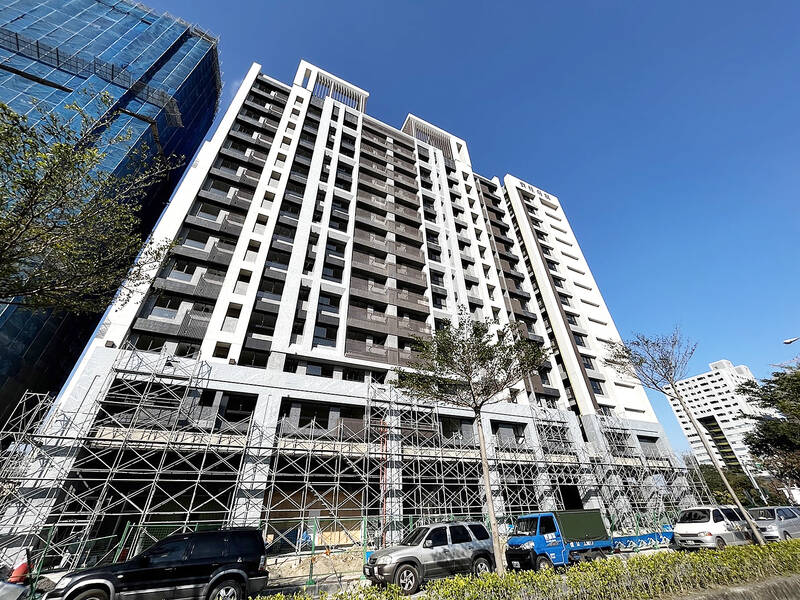New Taipei City-based property developer Pau Jar Group (寶佳機構) last year launched the most new projects nationally, as it capitalized on improved infrastructure to expand its business, a survey by the online realty arm of Addcn Technology Co (數字科技) showed.
The developer released 76 projects featuring more than 16,000 apartment units near high-speed train stations in Hsinchu, Taichung and Kaohsiung, as well as in second-tier locations, newhouse.591.com (591新建案) data showed.
The projects could attract NT$212.9 billion (US$7.01 billion) in revenue and have made the company visible in nearly all major markets across Taiwan, the online broker said.

Photo: Hsu Yi-ping, Taipei Times
While building on higher-value land near transportation hubs, Pau Jar did not abandon its focus on second-tier areas, the developer’s strongholds, to meet demand from buyers who cannot afford housing in popular locations, it said.
The strategy helped Pau Jar claim 10 percent of all new housing projects, it said.
High Wealth Construction Co (興富發) ranked second with seven projects expected to generate NT$70.2 billion in sales, the survey showed.
Maw Der Property Development Co (茂德機構) placed third with NT$65.3 billion in new projects that offer more than 3,000 apartment units, the online broker said, adding that most are in New Taipei City’s Sanchong (三重) and Wugu (五股) districts.
Presale house projects last year approached NT$2 trillion, and the top 10 players drove NT$600 billion, suggesting that they remained positive despite a slowdown in sales in the second half of last year, newhouse.591.com said.
The Fong-Yi Group (豐邑機構), a lesser known name focused mainly on on the Hsinchu and Taichung markets, placed fourth with NT$59.6 billion in presale projects, the survey showed.
Well-established brands I Sunny Co (愛山林建設), Huaku Development Co (華固建設) and Cathay Real Estate Development Co (國泰建設) remained major players, while Fu Yu Construction Co (富宇建設機構), Yun Hsin Construction Co (永信建設) and Hui Yu Architecture Co (惠宇建設) rounded out the top 10 list as property development increased in central and southern Taiwan during the past few years, newhouse.591.com said.
Developers plan to introduce more presale projects this year to land stock, although it is unknown how buyers might react to a ban on transfers of presale house purchase agreements, the online broker said.
The ban was passed by the legislature earlier this month, and the Ministry of the Interior is determining when the legislation should take effect.

SELL-OFF: Investors expect tariff-driven volatility as the local boarse reopens today, while analysts say government support and solid fundamentals would steady sentiment Local investors are bracing for a sharp market downturn today as the nation’s financial markets resume trading following a two-day closure for national holidays before the weekend, with sentiment rattled by US President Donald Trump’s sweeping tariff announcement. Trump’s unveiling of new “reciprocal tariffs” on Wednesday triggered a sell-off in global markets, with the FTSE Taiwan Index Futures — a benchmark for Taiwanese equities traded in Singapore — tumbling 9.2 percent over the past two sessions. Meanwhile, the American depositary receipts (ADRs) of Taiwan Semiconductor Manufacturing Co (TSMC, 台積電), the most heavily weighted stock on the TAIEX, plunged 13.8 percent in

A wave of stop-loss selling and panic selling hit Taiwan's stock market at its opening today, with the weighted index plunging 2,086 points — a drop of more than 9.7 percent — marking the largest intraday point and percentage loss on record. The index bottomed out at 19,212.02, while futures were locked limit-down, with more than 1,000 stocks hitting their daily drop limit. Three heavyweight stocks — Taiwan Semiconductor Manufacturing Co (TSMC, 台積電), Hon Hai Precision Industry Co (Foxconn, 鴻海精密) and MediaTek (聯發科) — hit their limit-down prices as soon as the market opened, falling to NT$848 (US$25.54), NT$138.5 and NT$1,295 respectively. TSMC's

TARIFFS: The global ‘panic atmosphere remains strong,’ and foreign investors have continued to sell their holdings since the start of the year, the Ministry of Finance said The government yesterday authorized the activation of its NT$500 billion (US$15.15 billion) National Stabilization Fund (NSF) to prop up the local stock market after two days of sharp falls in reaction to US President Donald Trump’s new import tariffs. The Ministry of Finance said in a statement after the market close that the steering committee of the fund had been given the go-ahead to intervene in the market to bolster Taiwanese shares in a time of crisis. The fund has been authorized to use its assets “to carry out market stabilization tasks as appropriate to maintain the stability of Taiwan’s

In a small town in Paraguay, a showdown is brewing between traditional producers of yerba mate, a bitter herbal tea popular across South America, and miners of a shinier treasure: gold. A rush for the precious metal is pitting mate growers and indigenous groups against the expanding operations of small-scale miners who, until recently, were their neighbors, not nemeses. “They [the miners] have destroyed everything... The canals, springs, swamps,” said Vidal Britez, president of the Yerba Mate Producers’ Association of the town of Paso Yobai, about 210km east of capital Asuncion. “You can see the pollution from the dead fish.